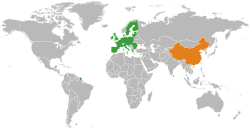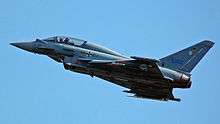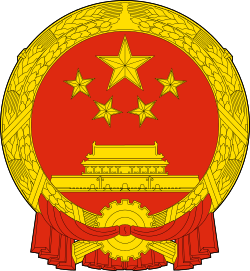China–European Union relations
 |
|
European Union |
China |
|---|---|
Sino-European relations refers to the relationship between the European Union (EU) and the People's Republic of China were established in 1975. A major point of contention in relations is the EU's arms ban to China. In addition, intellectual property rights infringement remains a point of tension.[1]
Agreements
Relations are governed by the 1985 EU-China Trade and Cooperation Agreement. Since 2007, negotiations have been underway to upgrade this to a new European Union Association Agreement and there are already 24 sectoral dialogues and agreements from environmental protection to education.[2]
History
After the end of the Cold War, relations with Europe were not as high a priority for China as its relations with the US, Japan and other Asian powers. However interest in closer relations started to rise as economic contacts increased and interest in a multipolar system grew. Although initially imposing an arms embargo on China after Tiananmen (see arms embargo section below), European leaders eased off China's isolation. China's growing economy became the focus for many European visitors and in turn Chinese businessmen began to make frequent trips to Europe. Europe's interest in China led to the EU becoming unusually active with China during the 1990s with high-level exchanges. EU-Chinese trade increased faster than the Chinese economy itself, tripling in ten years from USD14.3 billion in 1985 to USD45.6 billion in 1994.[3]
However political and security co-operation was hampered with China seeing little chance of headway there. Europe was leading the desire for NATO expansion and intervention in Kosovo, which China opposed as it saw them as extending US influence. However, by 2001 China moderated its anti-US stance in the hopes that Europe would cancel its arms embargo but pressure from the US led to the embargo remaining in place. Due to this, China saw the EU as being too weak, divided and dependent on the US to be a significant power. Even in the economic sphere, China was angered at protectionist measures against its exports to Europe and the EU's opposition to giving China the status of market economy in order to join the WTO.[3]
However, economic cooperation continued, with the EU's "New Asia Strategy", the first Asia–Europe Meeting in 1996, the 1998 EU-China summit and frequent policy documents desiring closer partnerships with China. Although the 1997 Asian financial crisis dampened investors enthusiasm, China weathered the crisis well and continued to be a major focus of EU trade. Chinese leaders were anxious to return the European interest and made high level visits throughout the 1990s, visits that were accompanied by major EU sales to China. Trade in 1993 saw a 63% increase from the previous year. China became Europe's fourth largest trading partner at this time. Even following the financial crisis in 1997, EU-Chinese trade increased by 15% in 1998.[3]
France was leading the EU's desire for closer ties in order to establish a multipolar world and was the first, along with Russia, to establish strategic partnerships with China.[3] However EU-China have experienced a cool down after China canceled the EU-China yearly summit in November 2008. This was apparently caused due to French President Sarkozy's plans to meet with the Dalai Lama.[4]
Trade
The EU is China's largest trading partner,[5][6] and China is the EU's second largest trade partner after the United States. Most of this trade is in industrial and manufactured goods. Between 2009 and 2010 alone EU exports to China increased by 38% and China's exports to the EU increased by 31%.[5]
| Direction of trade | Goods (2011)[7] | Services (2010)[7] | FDI (2010)[7] |
|---|---|---|---|
| EU-China | €136,2 billion | €22,3 billion | €7,1 billion |
| China-EU | €292,1 billion | €16,3 billion | €0,7 billion |
There have been some disputes, such as the dispute over textile imports into the EU (see below). China and the EU are increasingly seeking cooperation, for example China joined the Galileo project investing €230 million and has been buying Airbus planes in return for a construction plant to be built in China; in 2006 China placed an order for 150 planes during a visit by the President of France.[8] Also, despite the arms embargo, a leaked US diplomatic cable suggested that in 2003 the EU sold China €400 million of "defence exports" and later, other military grade submarine and radar technology.[9]
Textiles conflict
There is a dispute over textile imports into the EU (the Bra wars) with domestic European manufactures losing out to cheaper Chinese imported goods. The EU and China have finally reached an agreement ending the 'conflict of textiles', which poisoned their relations for several weeks. Both parties (the Chinese government on the one hand, European Commission on the other) have finally found Monday, Sept. 5, a deal that appears to end the dispute between Beijing and Brussels since the end of July. Under the terms of the agreement, China agreed, in exchange for the release of 80 million items held in European ports, only half of these are deducted from its export quotas for 2006.
Debt purchases
During the European debt crisis, several European countries required the EU and International Monetary Fund bailouts. China assisted Europe by buying billions of euros' worth of junk Eurozone bonds;[9] in particular from Greece, Ireland, Italy, Portugal and Spain. Some analysts suggested China was buying political influence in the EU but China maintains they are building strong trade ties and supporting the European economy so that trade issues can move ahead more smoothly.[10][11]
Science and technology
China and the EU launched their first science and technology cooperation program in 1983. They also drafted an Agreement on Scientific and Technological Cooperation in 1998 which was renewed in 2004 with the aim of linking research organisations, industry, universities and individual researchers in specific projects supported by the EU budget.[12] The current cooperation of the EU and China in the area of science and technology has been made available by the Horizon 2020 program. The Horizon 2020 initiative by the European Commission addresses the following areas: (i) food, agriculture and biotechnology (FAB); (ii) sustainable urbanization; (iii) energy; (iv) aeronautics; (v) and other areas including ICT, water, health, society, polar research, sme instrument, and space.[13]
Arms embargo

The EU arms embargo on China was imposed by the EU on the People's Republic of China in response to its suppression of the Tiananmen Square protests of 1989.[14] China stated its position that the embargo be removed, describing it "very puzzling" and amounting to "political discrimination". In January 2010, China again requested that the embargo be removed.[15]
Internal EU divisions
A leaked US cable indicated the internal divisions in the EU on the ban during negotiations in 2004. France viewed the ban as anachronistic and refused to consider attaching reforms in China as a condition, stating that "China would not accept human rights conditionality." Austria, Belgium, the Czech Republic, Greece, Italy and the UK were all broadly in the French camp. Germany, Denmark, Netherlands and Sweden wished to attach a lifting of the ban to "specific Chinese steps on human rights." All agreed in principle if certain conditions were met then the ban should be lifted.[9] Various EU heads of state have objected to the embargo or supported its continued existence. Angela Merkel has previously indicated her opposition to a lifting of the embargo, whereas her predecessor, Gerhard Schröder, had been in favour.[16]
The European Parliament has been consistently against removing the embargo. However, High Representative Catherine Ashton put forward plans for lifting the embargo in 2010, arguing that "The current arms embargo is a major impediment for developing stronger EU-China co-operation on foreign policy and security matters." The Chinese ambassador to the EU Song Zhe agreed, noting that "it doesn't make any sense to maintain the embargo."[17]
Outside pressure
The United States, which also has an arms embargo on China, states that lifting the embargo will create a technology transfer that will increase the capabilities of the Chinese army. The US has been influential in keeping the EU ban in place. The US sees China as a potential military threat and has pressured the EU in keeping it in place. In 2011 the Chinese EU ambassador suggested that in future that the EU make decisions on its own.[9][11]
Similarly, Japan is equally as against any attempt to remove arms restrictions to China.[18] Japan's government, particularly right-wing members of the cabinet, indicate that any such move will alter the balance of power in Southeast Asia strongly in favour of China at Japan's expense. China described Japan's position as provocative.[19] Meanwhile, Japan stated that the EU's proposal to lift the embargo in 2010 was a mistake in which caused great concern to Japan.[20]
Other trade
Whilst the embargo remains, China buys much of its arms from Russia. China had turned to Israel for surveillance planes, but under pressure from the U.S., Israel refused to go through with the deal.[18] Despite the ban, another leaked US cable suggested that in 2003 the EU sold €400 million of "defence exports" to China, and later approved other sales of military grade submarine and radar technology.[9]
See also
References
- ↑ Wyzycka, Natalia; Hasmath, Reza (2016-06-01). "The impact of the European Union's policy towards China's intellectual property regime". International Political Science Review: 0192512116641320. doi:10.1177/0192512116641320. ISSN 0192-5121.
- ↑ http://ec.europa.eu/external_relations/china/index_en.htm
- 1 2 3 4 Sutter, Robert G. (2008) Chinese Foreign Relations Maryland, Rowman & Littlefield Publishers. p.340-342
- ↑ Business fears over Chinese-French rift, Financial Times
- 1 2 http://ec.europa.eu/trade/creating-opportunities/bilateral-relations/countries/china/
- ↑ EU replaces U.S. as biggest trading partner of China(09/15/06) china-embassy.org
- 1 2 3 EU - China statistics
- ↑ With big order, China gives Airbus a boost iht.com
- 1 2 3 4 5 Rettman, Andrew (25 July 2011) Leaked cable shows fragility of EU arms ban on China, EU observer
- ↑ Phillips, Leigh (27 June 2011) Wen: China will continue to buy European debt, EU observer
- 1 2 Rettman, Andrew (8 July 2011) China: EU bailout leaves 'fundamental problems' unresolved, EU observer
- ↑ Casarini, N. (2009). Memorandum by Dr. Nicola Casarini. Stars and Dragons: The EU and China. European Union Committee.
- ↑ European Commission. (2016). EU-China research & innovation relations. European Commission.
- ↑ Q&A: China arms embargo row. BBC News. April 18, 2005.
- ↑ "China asks EU to scrap 'prejudiced' arms embargo". The Hindu. January 28, 2010.
- ↑ "Hu meets Merkel As Germany Reaffirms EU Arms Ban", Deutsche Welle, November 11, 2005.
- ↑ Rettman, Andrew (17 December 2010) Ashton pragmatic on China in EU foreign policy blueprint, EU Observer
- 1 2 "Japan concerned by call to lift China embargo - official", Forbes, November 27, 2008.
- ↑ "Abe's Support for EU Arms Embargo `Provocative', China Says", Bloomberg, January 18, 2007.
- ↑ Willis, Andrew (19 May 2011) Japan: Ashton was wrong on China arms ban, EU Observer
Further reading
The China Quarterly, Special Issue: China and Europe since 1978: A European Perspective No. 169 (March 2002).
Hu, S. “Structural Constraints on the EU’s Role in Cross-Taiwan Strait Relations,” European Journal of East Asian Studies, Vol. 10, No. 1 (2011): pp. 37-57.
External links
- Factsheet: EU-CHINA SUMMIT, 14 February 2012 - Beijing, PDF, contains a two pages summary of current status of EU Relations with China
- EU-China relations: a maturing partnership, EU Commission
- EU-China relations: Disappointment after Copenhagen, East Asia Forum
- understandingchina.eu
- EU text of 26-27 June 1989 declaration on China embargo
- European Union’s Arms Embargo on China - Implications and Options for U.S. Policy, Congressional Research Service The Library of Congress
- Francis Snyder, The European Union and China, 1949–2008: basic documents and commentary (Hart, 2009). Review by Salvatore Finamore in Web Journal of Contemporary Legal Issues, no. 3, 2010.
- Cheng Yu-Chin, NEW LEADERSHIP IN EU-CHINA: IRELAND'S EU PRESIDENCY V.S. CHINESE XI JINGPING
- The EU Arms Embargo on China: a Swedish Perspective, Swedish Defence Research Agency (FOI), 2010
